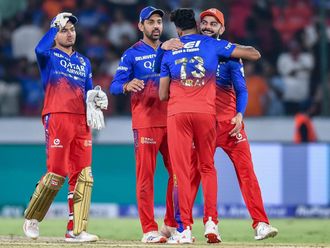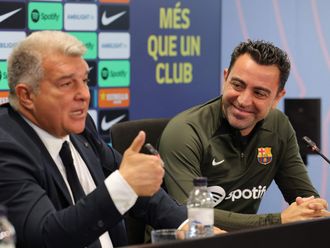Dubai: The Professional Squash Association (PSA) became the first global sports body to lift a ban on international players competing in Pakistan last month. The decision came five years after the 2009 attack on the Sri Lankan cricket team bus in Lahore, which prompted the sanction.
Air Vice-Marshal Syed Razi Nawab, the senior vice-president of the Pakistan Squash Federation, hopes the breakthrough will pave the way for more sports to return to the country. He also believes that the lifting of the ban will see Pakistan regain its status as a squash playing superpower.
Before the inception of the World Open in 1976, the British Open served as a de facto world championship. Pakistan won 13 of them in a row from 1951 to 1963, thanks to Hashim Khan (7), Azam Khan (3), Roshan Khan (1) and Mo Khan (1) with another in 1975 from Qamar Zaman.
Jahangir Khan then won six World Open titles from 1981 to 1988 before Jansher Khan won eight titles between 1987 and 1996. As a result, Pakistan is the most successful squash playing nation of all-time with 28 world titles.
The Green Shirts haven’t won a title in 18 years, but with the recent lifting of the ban, Nawab told Gulf News that glory could return. Following are the excerpts of an exclusive interview:
Gulf News: How did you persuade the PSA to lift the ban?
Syed Razi Nawab: We couldn’t invite overseas seniors for tournaments, but we could invite veterans. So, we hosted the Asian Masters in 2012. This broke the ice and restored confidence. We also hosted six former world champions on the sidelines of the event, which conveyed the message that Pakistan is a safe, sports loving country that knows how to take care of its guests. Pakistan getting representation back in the Asian Squash Federation (ASF) with my election as senior vice-president in 2013 also allowed us to squeeze back into decision making circles. We hosted an Asian junior event with nine Asian countries later that year and invited officials to see for themselves.
How was the ban affecting Pakistan Squash?
At 11 per cent, Pakistan has one of the highest number of registered squash players with the PSA, but we only host two per cent of tournaments. Players had to travel abroad for tournaments but often have difficulty with obtaining visas. The talents of a whole generation of squash players were being wasted through no fault of their own. Also, due to the international player ban we were being allocated weaker prize-fund and point-value tournaments, because the PSA didn’t want Pakistan players to have an unfair advantage in the rankings, progressing only by virtue of their being no visiting competition. We could only host four US$10,000 tournaments a year, but in our prime we had been holding three US$150,000 events a month.
With bigger tournaments, will Pakistan’s players get back up the rankings?
With the lifting of this international ban and the return of bigger prize-money and point-value tournaments, I expect Pakistan to break into the Top 20 by the end of the year. We already have Nasir Iqbal who is currently ranked World No.42. This is a realistic prediction. It’s not realistic to believe we will come back and be world champions, yet. We have to regain and retain our lost position and get back to the top, but this will take time. We have seen the zenith and have come down but an ascent is there.
When will international players compete in Pakistan and will they be safe?
We will host a US$25,000 tournament open to international players in Islamabad from October 18. This is just the first step, as we are expecting bigger tournaments in the future. However, in order to do that we must prove we can put on a safe, conducive and comfortable event in October. It will be safe. I’m making this claim with heavy pressure on myself. We’ve done it with veterans and juniors during the ban so I see no reason why we can’t do it again.
Will this prompt other sports to return to Pakistan?
Squash is a smaller sport than cricket and football. But we have taken the lead and set a precedent. Hopefully more global sports bodies will follow the PSA in lifting the ban and this will pave the way to more sports returning to Pakistan. We should put our heads together and persuade other sports bodies. This is surely a milestone for others to follow. The soft power of a country is in its sport, culture and tourism, we’ve lacked the ability to showcase that recently but hopefully sport will change that.












